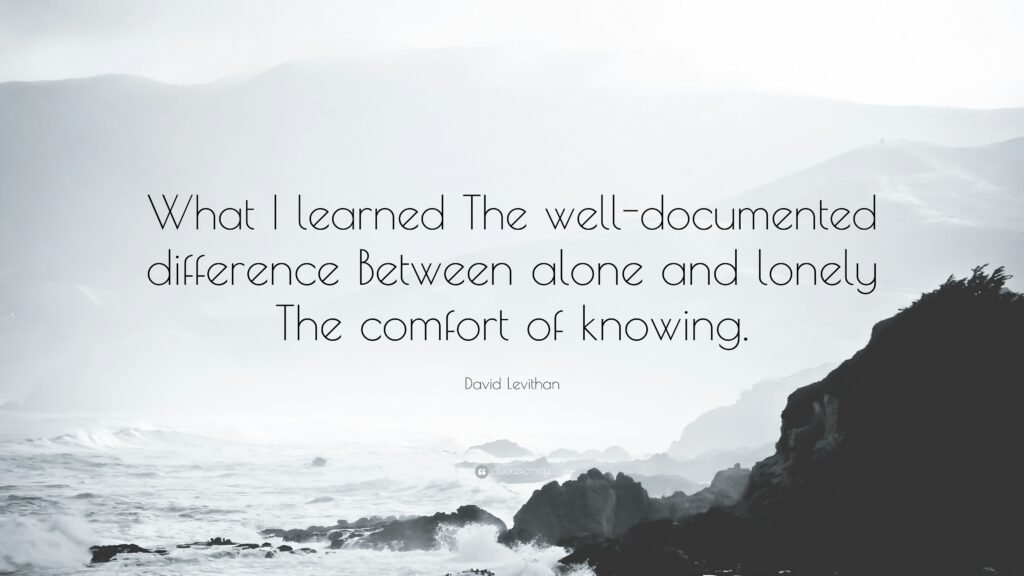
What is Loneliness
Loneliness is a complex and multifaceted emotional and psychological state characterized by a feeling of isolation, disconnection, and a lack of meaningful social or emotional connection with others. It is often accompanied by a sense of emptiness, sadness, and a desire for companionship or social interaction. Loneliness can be both a transient feeling that comes and goes, or it can be a chronic and persistent condition that has long-lasting effects on an individual’s mental and physical well-being.
Loneliness can result from various circumstances, including
- Social Isolation: When a person lacks social interactions or feels excluded from social groups or communities.
- Emotional Loneliness: Feeling emotionally disconnected from others, even when surrounded by people.
- Relational Loneliness: Missing a specific, close relationship or the absence of meaningful connections.
- Cultural or Societal Factors: Loneliness can be influenced by cultural norms, societal pressures, and changing lifestyles that may lead to less face-to-face social interaction.
- Life Transitions: Major life changes such as moving to a new city, going through a breakup, or the death of a loved one can trigger feelings of loneliness.
- Mental Health: Loneliness can be both a cause and a consequence of mental health issues such as depression, anxiety, or social anxiety disorder.
- Technology and Social Media: Paradoxically, excessive use of technology and social media can contribute to loneliness by reducing in-person interactions and creating a sense of social comparison.
Loneliness can have adverse effects on a person’s physical and mental health. Prolonged loneliness has been associated with increased stress levels, depression, anxiety, reduced immune function, and even a higher risk of chronic diseases. Recognizing and addressing loneliness is important for overall well-being. Strategies for coping with loneliness may include seeking social support, engaging in activities that promote social interaction, joining clubs or groups with shared interests, and seeking professional help if loneliness is leading to severe emotional distress or impacting daily life.
What is Loneliness &How to overcome from Loneliness
Overcoming loneliness can be a challenging process, but there are strategies and steps you can take to address and alleviate feelings of loneliness. Keep in mind that the effectiveness of these strategies can vary from person to person, and it may take time to see significant improvements. Here are some steps to help you overcome loneliness:
- Recognize and Acknowledge Your Feelings: The first step is to acknowledge that you’re feeling lonely. Understand that loneliness is a common and natural human emotion, and it’s okay to feel this way.
- Understand the Cause: Try to identify the underlying causes of your loneliness. Is it due to social isolation, a lack of close relationships, major life changes, or other factors? Understanding the root cause can help you address it more effectively.
- Reach Out to Friends and Family: Don’t hesitate to connect with people you already know. Reaching out to friends or family members can be a great way to combat loneliness. Invite them for a chat, a meal, or an activity you both enjoy.
- Join Social Groups or Communities: Seek out opportunities to meet new people and build connections. Consider joining clubs, classes, or social groups that align with your interests or hobbies. This can help you find like-minded individuals and expand your social circle.
- Volunteer: Volunteering for a cause you care about is a great way to connect with others who share your interests and values. It also provides a sense of purpose, which can combat loneliness.
- Online Communities: While online interactions should not replace in-person connections, they can be a valuable supplement, especially if you have difficulty accessing social opportunities in your physical environment. Participate in online forums, groups, or social media communities related to your interests.
- Practice Self-Compassion: Be kind to yourself and avoid self-criticism. Loneliness can lead to negative self-talk, but practicing self-compassion can help you maintain a positive self-image.
- Seek Professional Help: If loneliness is causing severe distress, negatively impacting your mental health, or persisting despite your efforts, consider speaking with a mental health professional. They can provide guidance and support tailored to your specific situation.
- Develop New Skills: Pursuing personal growth and learning new skills can boost your confidence and provide opportunities to meet people. Consider taking up a new hobby, enrolling in classes, or attending workshops.
- Create a Routine: Establishing a daily routine with activities that bring you joy and purpose can help combat loneliness. A structured schedule can also provide a sense of stability and predictability.
- Practice Gratitude: Focus on the positive aspects of your life and the connections you do have. Keeping a gratitude journal can help shift your mindset from loneliness to appreciation.
- Be Patient: Overcoming loneliness is a process that may take time. Be patient with yourself and the journey of building meaningful connections. Celebrate small victories along the way.
Remember that everyone’s experience with loneliness is unique, and it’s okay to seek support and guidance from friends, family, or mental health professionals as you work to overcome it. Building and maintaining meaningful relationships and connections is an ongoing effort, and it’s essential to prioritize your well-being throughout the process.

How to overcome from Loneliness and Depression
Combating loneliness and depression often involves a multifaceted approach, and it’s important to seek professional help when needed. Here are some strategies that can help you work towards overcoming loneliness and depression:
- Reach Out for Support: Don’t hesitate to reach out to friends, family members, or a trusted person in your life and let them know how you’re feeling. Sharing your thoughts and feelings with someone you trust can be a crucial first step.
- Professional Help: Consider seeking therapy or counseling from a mental health professional, such as a therapist, psychologist, or psychiatrist. They can provide you with valuable support, coping strategies, and treatment options tailored to your specific needs.
- Medication: In some cases, medication may be prescribed by a healthcare provider to manage symptoms of depression. This should be done under the guidance and supervision of a qualified medical professional.
- Physical Activity: Engage in regular physical activity. Exercise has been shown to have a positive impact on mood and can help alleviate symptoms of depression.
- Healthy Eating: Maintain a balanced and nutritious diet. Nutrient-rich foods can have a positive effect on both physical and mental well-being.
- Sleep Hygiene: Ensure you get enough restful sleep. Establish a consistent sleep schedule and create a relaxing bedtime routine to improve sleep quality.
- Mindfulness and Meditation: Practices like mindfulness meditation can help you become more aware of your thoughts and feelings, reduce stress, and improve your emotional well-being.
- Set Realistic Goals: Break down your goals into smaller, achievable steps. Accomplishing even small tasks can boost your sense of accomplishment and self-esteem.
- Limit Negative Self-Talk: Challenge and reframe negative thoughts. Cognitive-behavioral therapy (CBT) techniques can be helpful in identifying and changing negative thought patterns.
- Engage in Enjoyable Activities: Participate in activities you used to enjoy or explore new hobbies and interests. Doing things you love can improve your mood and sense of purpose.
- Social Connections: Make an effort to connect with others, even when you don’t feel like it. Isolation can worsen loneliness and depression. Reach out to friends, family, or support groups.
- Limit Alcohol and Substance Use: Excessive alcohol or substance use can exacerbate depression. Seek help if you are struggling with addiction issues.
- Create a Routine: Establishing a daily routine can provide structure and a sense of normalcy, which can be helpful in managing depression.
- Journaling: Keeping a journal can help you express your thoughts and emotions, track your progress, and identify patterns in your mood.
- Seek Purpose: Identify activities or causes that give you a sense of purpose and fulfillment. This can provide motivation and a reason to get out of bed each day.
- Be Patient and Kind to Yourself: Recovery from depression and loneliness can be a gradual process. Be patient with yourself and practice self-compassion.
It’s important to remember that overcoming depression and loneliness may take time, and it’s okay to seek professional help and support along the way. Depression is a medical condition, and seeking treatment is a sign of strength, not weakness. A mental health professional can work with you to develop a personalized treatment plan that suits your needs and circumstances.
How to overcome from Loneliness and rejection
Overcoming loneliness and dealing with rejection can be challenging, but with time and effort, it is possible to build resilience and improve your emotional well-being. Here are some strategies to help you cope with loneliness and rejection:
1. Self-Compassion: Be kind and compassionate towards yourself. Understand that experiencing loneliness and rejection is a part of life, and it does not define your worth as a person. Avoid self-blame and self-criticism.
2. Seek Support: Reach out to friends, family members, or a trusted confidant. Talking about your feelings with someone you trust can provide emotional support and comfort.
3. Join Supportive Communities: Look for support groups, online communities, or local organizations that focus on topics or interests you are passionate about. Connecting with others who share your interests can be a great way to combat loneliness and find like-minded individuals.
4. Challenge Negative Thoughts: Rejection and loneliness often lead to negative thought patterns. Challenge and reframe these thoughts. Cognitive-behavioral therapy (CBT) techniques can be useful in identifying and changing negative thought patterns.
5. Focus on Your Strengths: Acknowledge your strengths and achievements. Reflect on your past successes and remind yourself of your capabilities.
6. Set Realistic Expectations: Understand that not every interaction will lead to acceptance or a positive outcome. Rejection is a normal part of life. Setting realistic expectations can help you handle rejection more effectively.
7. Learn from Rejection: Instead of dwelling on rejection, try to see it as an opportunity for growth and learning. What can you take away from the experience? What can you do differently next time?
8. Engage in Self-Care: Take care of your physical and mental well-being. Engage in activities that make you feel good, whether it’s exercise, meditation, reading, or spending time in nature.
9. Pursue Your Interests: Invest time in your hobbies and passions. Engaging in activities you love can be a source of joy and fulfillment, which can counteract feelings of loneliness and rejection.
10. Expand Your Social Circle: Be open to meeting new people and forming new connections. Attend social events, join clubs, or engage in activities that allow you to interact with others.
11. Practice Patience: Overcoming loneliness and dealing with rejection can be a gradual process. Be patient with yourself and acknowledge that healing takes time.
12. Professional Help: If loneliness or rejection is causing significant distress or interfering with your daily life, consider seeking support from a therapist or counselor. They can provide specialized guidance and strategies to help you cope.
13. Cultivate Resilience: Focus on building resilience, which involves developing the ability to bounce back from adversity. Resilience can help you better navigate rejection and challenging life situations.
14. Set Boundaries: Ensure you establish healthy boundaries in your relationships. Setting boundaries can help protect your emotional well-being and reduce the risk of experiencing rejection or hurtful situations.
Remember that everyone faces rejection and loneliness at some point in their lives. These experiences, while painful, can also provide opportunities for personal growth and self-discovery. It’s important to be patient with yourself and seek support when needed to navigate these challenges successfully.
read about15 Advantages of vegetarian food
How to deal with loneliness in a relationship
Loneliness within a relationship can be particularly challenging because it often involves feeling isolated or disconnected from your partner despite being in a committed relationship. If you’re experiencing loneliness in your relationship, here are some strategies to address and improve the situation:
1. Open Communication: The first step is to have an honest and open conversation with your partner about how you’re feeling. Express your emotions and concerns without blame or criticism. Use “I” statements to convey your feelings and needs.
2. Identify the Cause: Together with your partner, try to identify the reasons behind your loneliness. Is it due to a lack of emotional intimacy, communication issues, differences in needs and expectations, or external stressors? Understanding the root cause is essential for finding solutions.
3. Quality Time: Make an effort to spend quality time together. This doesn’t just mean being physically present but actively engaging with each other. Plan activities you both enjoy and set aside time for meaningful conversations.
4. Communicate Expectations: Discuss your expectations and needs in the relationship. Sometimes, loneliness arises when partners have different ideas about what they need from each other. Clarify what you both want and need from the relationship.
5. Express Affection: Show love and affection toward your partner regularly. Small gestures, like hugging, holding hands, and saying “I love you,” can go a long way in nurturing emotional connection.
6. Seek Professional Help: If the loneliness persists and you’re unable to resolve it on your own, consider seeking couples counseling or therapy. A trained therapist can help you and your partner work through your issues and improve your relationship.
7. Individual Self-Care: While focusing on the relationship is important, don’t neglect your own well-being. Engage in self-care activities that make you feel happy and fulfilled outside of the relationship. This can help reduce the emotional burden of loneliness.
8. Maintain a Support System: Continue to nurture your friendships and connections outside of the relationship. Having a strong support system can provide emotional comfort and reduce the intensity of loneliness.
9. Be Patient: Solving relationship issues, including loneliness, can take time. Be patient with yourself and your partner as you work through these feelings together.
10. Consider Compatibility: Sometimes, despite efforts, two people may not be compatible in the long term. If you find that your loneliness persists despite trying to improve the relationship, it may be worth evaluating whether the relationship is truly fulfilling your emotional needs.
11. Reflect on Personal Growth: Use the time of loneliness to reflect on your own personal growth and goals. Sometimes, personal development can lead to improved self-esteem and greater emotional resilience, which can positively impact the relationship.
Remember that loneliness in a relationship is a common issue, and it’s not a reflection of your worth or your partner’s. It’s a signal that something in the relationship needs attention and adjustment. With open communication, effort from both partners, and, if necessary, professional help, it’s possible to overcome loneliness and strengthen your connection with your partner.
Differences between alone and loney

Here’s a table outlining the differences between being alone and being lonely:
| Aspect | Alone | Lonely |
|---|---|---|
| Definition | Physically solitary, not in the presence of others | Feeling a lack of meaningful social connection |
| Social Interaction | Can be alone by choice or preference | Loneliness often implies a desire for company |
| Emotional State | Can be content, relaxed, or peaceful | Generally involves sadness, emptiness, or pain |
| Temporary vs. Chronic | Can be temporary or occasional | Can be a chronic or persistent feeling |
| Relationship Status | Can occur in both single and coupled individuals | Can occur in both single and coupled individuals |
| Emotional Impact | May or may not be emotionally distressing | Often associated with emotional distress |
| Positive Aspects | Opportunities for self-reflection and solitude | Opportunities for self-awareness and growth |
| Negative Aspects | Can lead to feelings of isolation or boredom | Can lead to mental and physical health issues |
| Addressing the State | May not require intervention | May benefit from seeking social connections |
It’s important to note that being alone is not inherently negative, and many people enjoy and value alone time as an opportunity for self-reflection, relaxation, and personal growth. Loneliness, on the other hand, typically refers to the emotional distress that can result from a lack of meaningful social connection and is often seen as a negative and uncomfortable state.
Conclusion
In conclusion, loneliness is a complex and multifaceted emotional state characterized by a feeling of isolation and a lack of meaningful social or emotional connections with others. It can result from various circumstances, including social isolation, life transitions, mental health issues, and more. Loneliness can have adverse effects on a person’s mental and physical well-being.
Overcoming loneliness involves recognizing and acknowledging one’s feelings, understanding the causes, and taking proactive steps to address it. Strategies for combating loneliness include reaching out to friends and family, joining social groups, volunteering, practicing self-compassion, and seeking professional help when needed.
Loneliness can often coexist with depression, another significant mental health condition. To overcome both loneliness and depression, it’s essential to engage in open communication, seek support from loved ones and professionals, practice self-care, and consider therapy or medication when appropriate.
Loneliness can also be experienced within a romantic relationship. Dealing with loneliness in a relationship requires open and honest communication with your partner, identifying the root causes, spending quality time together, and seeking professional help if necessary. It’s important to remember that addressing loneliness in a relationship is a collaborative effort that can lead to improved emotional connection and satisfaction.
In summary, loneliness is a common human experience that can affect various aspects of life, including personal well-being, relationships, and mental health. Addressing loneliness requires self-awareness, self-compassion, support from others, and, in some cases, professional assistance. With the right strategies and support, individuals can work towards reducing feelings of loneliness and improving their overall quality of life.
FAQs
Loneliness and Overcoming Loneliness:
1. What is the difference between loneliness and solitude?
- Solitude is the state of being alone by choice and can be a positive and peaceful experience. Loneliness, on the other hand, is an involuntary feeling of isolation and a lack of meaningful social connection.
2. Can loneliness be a sign of a mental health issue?
- Yes, persistent loneliness can be associated with mental health conditions such as depression, anxiety, and social anxiety disorder.
3. Is it possible to be lonely in a crowded room?
- Yes, loneliness is a subjective emotional state, and one can feel lonely even when surrounded by many people if they lack meaningful connections or feel disconnected from others.
4. What are some practical steps to overcome loneliness?
- Practical steps include reaching out to friends and family, joining social groups, volunteering, practicing self-compassion, seeking professional help if needed, and engaging in activities that promote social interaction.
Depression and Overcoming Depression:
1. How can I differentiate between feeling sad and clinical depression?
- Clinical depression is characterized by persistent and severe symptoms such as low mood, loss of interest or pleasure in activities, changes in sleep and appetite, fatigue, and feelings of worthlessness or guilt. If these symptoms persist for an extended period, it may indicate clinical depression.
2. Can lifestyle changes help in managing depression?
- Yes, lifestyle changes such as regular exercise, a balanced diet, adequate sleep, stress management, and social support can complement traditional treatments for depression and improve overall well-being.
3. Is medication always necessary to treat depression?
- Medication may be recommended for moderate to severe depression, but it is not always necessary. Mild depression can often be managed through therapy, lifestyle changes, and social support.
4. How can I support a loved one who is struggling with depression?
- Supporting a loved one with depression involves being empathetic, encouraging them to seek professional help, offering emotional support, and avoiding judgment or criticism.
Loneliness in Relationships:
1. Can you experience loneliness even when you’re in a committed relationship?
- Yes, it’s possible to feel lonely within a relationship if there is a lack of emotional intimacy or meaningful connection with your partner.
2. What are some signs that loneliness is affecting a relationship?
- Signs may include reduced communication, emotional distance, a lack of quality time together, and a general feeling of disconnection.
3. How can couples work together to address loneliness in their relationship?
- Couples can address loneliness through open and honest communication, quality time together, expressing affection, seeking professional counseling if necessary, and working on improving emotional intimacy.
also readHow to stop bad habits |3 steps to changing bad habits






